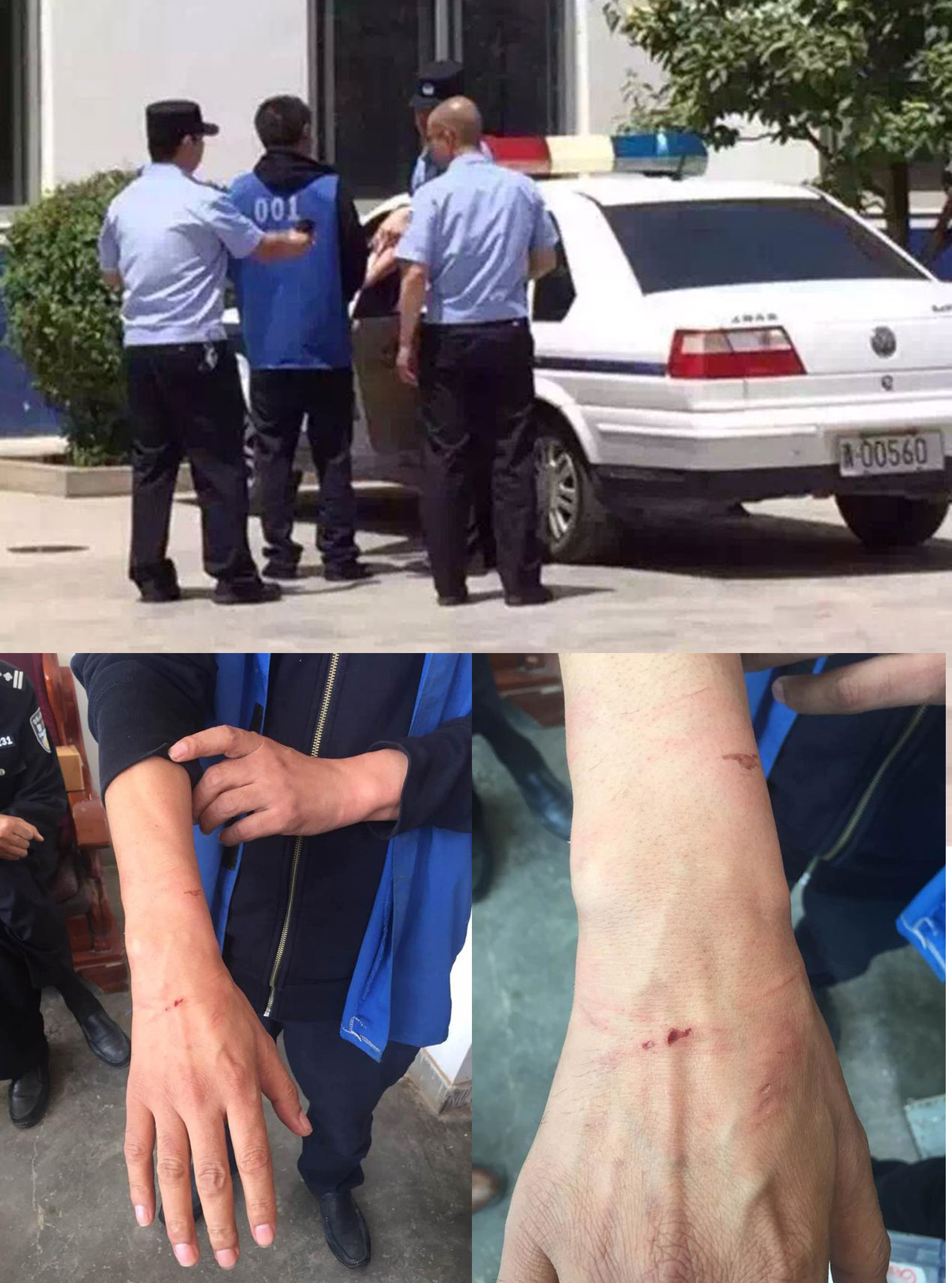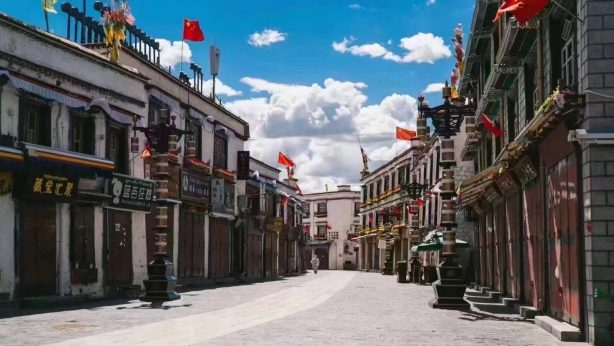TCHRD condemns detention and ill-treatment of noted Tibetan director Pema Tseden

The Tibetan Centre for Human Rights and Democracy (TCHRD) expresses shock and condemnation over the detention and hospitalisation of the critically acclaimed and award-winning Tibetan director, writer and producer Pema Tseden at Xining airport in Qinghai Province. Local Chinese authorities used excessive force and violence to detain and interrogate Pema Tseden using the infamous ‘Tiger Chair’ (老虎凳) method and without informing his family members.
According to media reports, Pema Tseden flew in from Beijing to Xining on the night of 25 June when he was detained at the baggage claim area of Xining airport. While on his way out of the airport, he had gone back to retrieve a luggage he had forgotten. In the process of retrieving the luggage, an altercation ensued between Pema Tseden and the airport security officers, which led to the arrival of additional security personnel who then handcuffed and detained Pema Tseden without any explanation. The Xining Airport Public Security Bureau (PSB) charged Pema Tseden of ‘disturbing public order’ and punished him to five days “administrative detention” before taking him to an administrative detention facility in Tsongkha (Ch: Ping’An) town in Tsoshar (Ch: Haidong) city. While in detention, he suffered dizziness, chest tightness, and numbness of limbs, and was later taken for emergency treatment in a hospital in Ping’An.
Pema Tseden’s experience so far reveals not just the arbitrary manner in which Chinese law enforcement agencies subject individual citizens to abuse and violence. Pema Tseden’s travails represent the everyday restrictions and discrimination the so-called minorities such as Tibetans and Uyghurs have to face when passing through public places such as airports and train stations in Tibet and elsewhere in China. Generally at public places such as airports, train stations and guesthouses, Chinese authorities impose extra restrictions on ‘minority nationalities’ such as Tibetans, Uyghurs and Mongols and require them to fulfill intrusive and often humiliating background checks similar to racial profiling. For instance, at Lhasa Gonggar Airport and Lhasa Railway Station in Tibet Autonomous Region (TAR), Tibetans are separated from the rest of the passengers and made to undergo security check in a separate queue. Pema Tseden’s detention has put the much-needed spotlight on the issue of racial profiling and the enormous difficulties faced by Tibetans and other ‘minority nationalities’ in exercising their right to freedom of movement and travel.
While detaining Pema Tseden, the Xining airport security officers reportedly scolded him, “People like you who knows the situation and yet, being disobedient, need to be detained,” Sonam Gyal, a friend of the noted director was quoted as saying in media reports. In an official statement, Meng Jun, the propaganda head of Xining Airport Security Bureau said, “This kind of incidents happens on regular basis at this airport. Since he [Pema Tseden] is a famous Tibetan filmmaker, this incident has attracted huge attention.” Meng Jun’s statement demonstrates the level of apathy and indifference among law enforcement authorities when it comes to ordinary citizens suffering all kinds of abuses including arbitrary detention and inhumane treatment.

The detention and violent treatment meted out to Pema Tseden sparked widespread attention and concern among Tibetan and Chinese netizens and the international community at large. In statement issued on 29 June, the China Film Directors Guild urged the authorities to issue a clear and timely explanation on why he was detained and interrogated with excessive use of force. The same evening, a notice issued by the Qinghai Civil Aviation Airport Public Security Bureau appeared on Qinghai News Online stated that Pema Tseden was charged of ‘disturbing public order’ for not listening to the advice of airport staff and security officers and engaging in illegal behaviour. However, Pema Tseden’s friends who witnessed the whole incident at the airport provided a version different in media interviews. Not soon after, the notice issued by Qinghai Civil Aviation Airport Public Security Bureau was found removed.
The punishment given to Pema Tseden, for reasons that are still not clear, is five days administrative detention, a form of arbitrary detention similar to the infamous ‘Re-education Through Labour’ (RTL), which gives enormous powers to the security forces to detain and subject individuals to violent interrogation methods such as beatings, torture and other inhumane treatment. Individuals subjected to administrative detention have no way accessing legal representation or fair trials, and at the total mercy of law enforcement agencies such as the police. RTL was abolished in 2013 after years of campaigning and pressure from domestic and international human rights activists and lawyers. Under RTL, police could detain people for as many as four years without trial.
Pema Tseden was punished with five-day administrative detention by the Xining Airport security officers. His family members were not informed about his detention. Without giving any explanation, the airport security officers “forcefully handcuffed him, held him by his hair and dragged him away”; he was deprived of sleep the same night and was interrogated. Pema Tseden was also subjected to the brutal ‘Tiger Chair’ interrogation method on the night of his detention at the airport. During the course of interrogation, he sustained various injuries on his body. He was taken the following morning to the Ping’An detention facility. On 27 June, he was taken for emergency treatment. Another friend of Pema Tseden named Keke told some online news platforms that the officers at Ping’An detention facility ordered Pema’s friends and family members to take full responsibility for his health and to bear all costs for treatment. Pema is required to complete the remaining three days of detention after his release from hospital.
The notice issued by the Qinghai Civil Aviation Airport Security Bureau also claimed that the police strictly followed the laws and regulations when interrogating Pema Tseden, adding that there is an audio-visual recording of the full interrogation process. The propaganda head of Xining Airport Security Bureau Meng Jun also claimed that there was a surveillance camera recording of the entire incident and that the airport police recorded the entire incident in writing. More than five days after the incident, there is no clear statement from the authorities on what actually led to the famous filmmaker’s detention and brutal interrogation. Meanwhile, all posts related to the incident have been removed online and restrictions are placed on any attempts to posts further information.
TCHRD urges the Chinese authorities to ensure that justice is done to Pema Tseden who was subjected to excessive use of force and punishment for trying to retrieve his belonging. The centre also appeals the Chinese authorities to issue a clear and honest explanation on what actually happened at Xining airport on the night of 25 June. This is important for not only for Pema Tseden’s family members, friends and colleagues, but many others across the world who have expressed concern and shock over the celebrated director’s wellbeing.
Pema Tseden was born in 1969 in Trika (Ch: Guide) County in Tsolho (Ch: Hainan) Tibetan Autonomous Prefecture, Qinghai Province, in the Tibetan province of Amdo in 1969. He was educated at the Northwest University for Nationalities in Lanzhou and Beijing Film Academy. Since 1991, he has written over 40 short stories in Tibetan and Chinese language, and translated over 20 essays. He has received numerous awards for his writings including the Fourth New Literature Writings of Qinghai and Excellency Prize in the Fifth Contemporary Minorities New Literature Writings of China. He began his film career in 2002 making such critically acclaimed and award-winning works such as The Silent Holy Stones, Searching for Drimey Kunden, Old Dog and Tharlo. He is a member of the China Film Directors’ Guild, China Film Association and Chinese Film Literature Association.
Sources:
http://ent.sina.com.cn/m/c/2016-06-29/doc-ifxtsatm0986556.shtml
http://news.ifeng.com/a/20160629/49264697_0.shtml
http://www.legaldaily.com.cn/index/content/2016-06/29/content_6694299.htm?node=20908
https://theinitium.com/article/20160629-dailynews-Pema-Tseden/
http://china.caixin.com/2016-06-29/100960285.html
http://www.legaldaily.com.cn/index/content/2016-06/29/content_6694299.htm?node=20908

